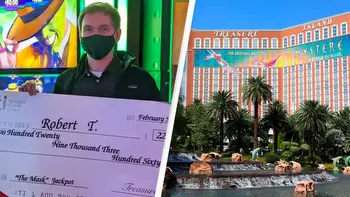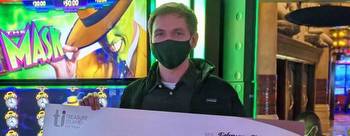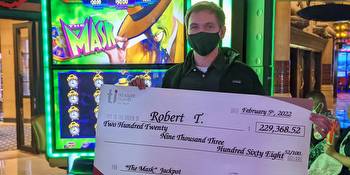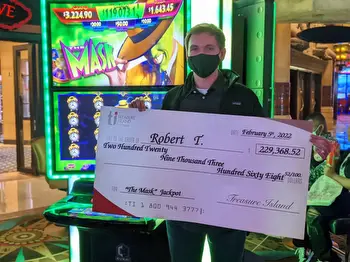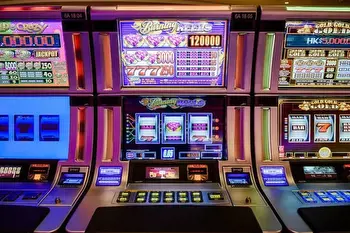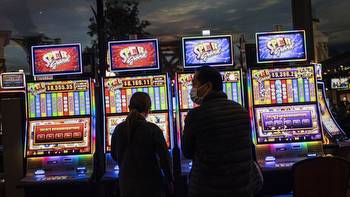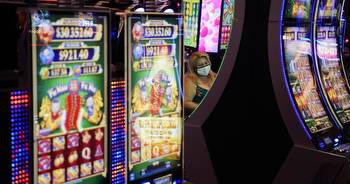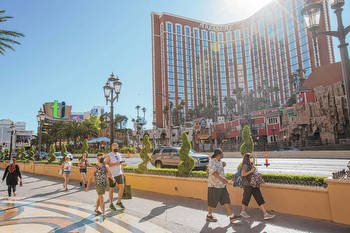A tourist had a $229,000 win on a broken Vegas slot machine. He didn't know it until investigators tracked him down

On the night of January 8, Robert Taylor, a tourist from Arizona, popped some money into a slot machine at Treasure Island Hotel & Casino in Las Vegas.
Then, Taylor hit the jackpot, winning nearly $US230,000 ($A321,950) - only he didn't know it.
The machine had malfunctioned, the Nevada Gaming Control Board said in a news release. Its screen read: "Resolving progressive prize. Please wait."
Taylor and his family stuck around for a few minutes while Treasure Island staff attempted to figure out what was going on. But they had a dinner reservation to catch and soon left the casino, according to James Taylor, chief of the board's enforcement division, who is of no relation to Robert Taylor.
"He left the casino thinking the machine had malfunctioned and that he had not won," James Taylor told The Washington Post.
After his trip to Vegas, Robert Taylor returned to his home in Arizona and moved on with his life. Then, on January 28, the casino reached out and notified him that he'd won $US229,368.52 on the slot machine weeks earlier.
It took the board nearly three weeks to locate Taylor, whose identity was not immediately known, the Nevada Gaming Control Board said. The board's enforcement division launched an extensive review of surveillance video "across multiple gaming properties" and interviewed several witnesses.
Investigators went as far as studying credit card receipts and analysing ride-hailing data collected by the Nevada Transportation Authority.
"We did a lot," said James Taylor, who has worked with the Nevada Gaming Control Board for 27 years. "It took a while. It wasn't overnight."
Robert Taylor could not be reached by The Post for an interview. But surveillance footage reviewed by investigators helps explain what happened when he visited the casino last month. That January evening, Taylor had just started betting on the machine before it malfunctioned, surveillance video showed.
Taylor notified casino staff when the machine became inoperable. The staff paid him the roughly $US40 credit he had in the machine, and Taylor and his family left for dinner, chief investigator James Taylor told The Post.
Two days later, a team of workers fixed the machine, Taylor added.
"That's when they detected the jackpot hit," he said.
That set the search for the winner in motion. The casino contacted the Nevada Gaming Control Board for help solving the mystery.
Since the matter was not a criminal one, Taylor's team of investigators could not rely on subpoenas to access information. Instead, agents began reviewing hours of surveillance video, tracking down witnesses and trying to retrace the winner's steps.
"At that point, we didn't think we could identify the person," Taylor told The Post.
Then the team got its first substantial lead. Data collected by the Nevada Transportation Authority showed that Robert Taylor and his family had used a ride-hailing service that evening. They'd paid with a credit card, which ultimately led investigators to their winner.
"That was our Hail Mary pass," James Taylor told The Post.
After making contact, his team of investigators asked the family to provide pictures of what they were wearing the night of Jan. 8, along with information about where they had dined and a detailed description of their whereabouts inside the casino. Everything matched the surveillance footage showing the jackpot winner.
"It became evident that we had the right person," Taylor said.
The casino contacted Robert Taylor and on Saturday, and he travelled back to Las Vegas to pick up his check.
"We are thrilled that our jackpot winner was found by the Nevada Gaming Control Board and we are happy to have awarded him his winnings on Saturday," a Treasure Island spokesperson told The Post in an email.
Had the gaming board failed to locate the man from the security tapes, the nearly $US230,000 prize would've gone unclaimed until a new winner hit the jackpot.
James Taylor, who has led the board's enforcement division for 2½ years, said his team investigates nearly 400 claims per year from gamblers who believe they've won a prize. Most of the time, they are wrong, he said.
"There's never been anything like this before, and that's why it's so exciting to have a great conclusion to this story," Taylor told The Post.








